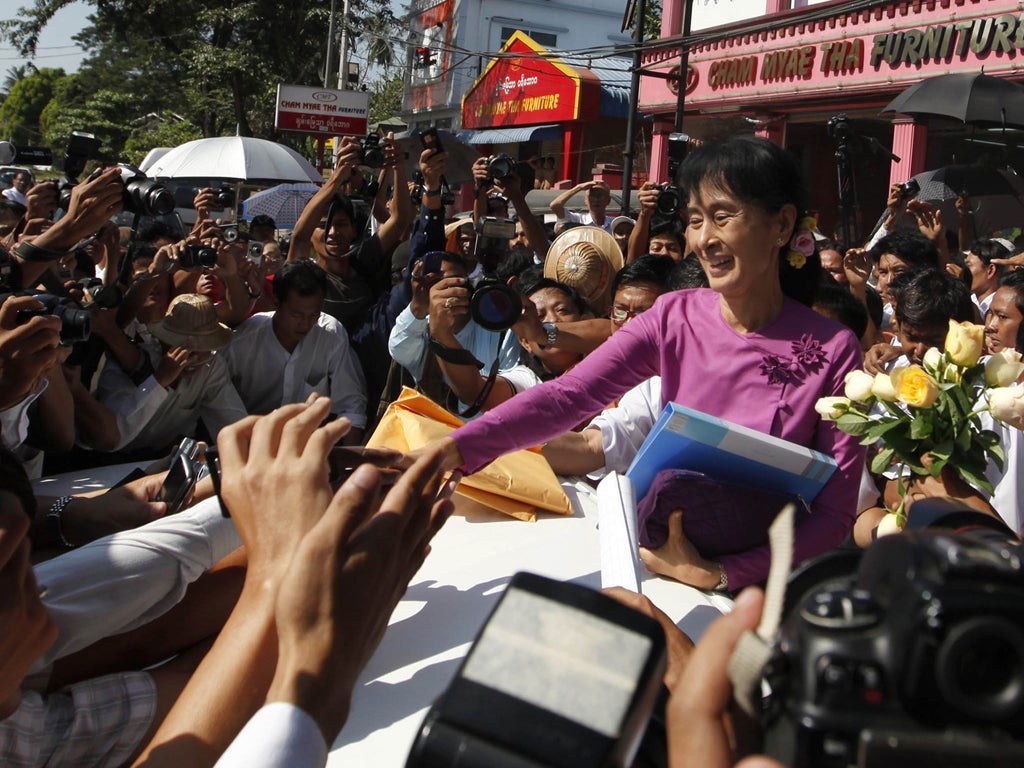From prisoner of the state to future President?
Milestone in Suu Kyi's epic journey as her party agrees to take part in Burmese elections

Your support helps us to tell the story
From reproductive rights to climate change to Big Tech, The Independent is on the ground when the story is developing. Whether it's investigating the financials of Elon Musk's pro-Trump PAC or producing our latest documentary, 'The A Word', which shines a light on the American women fighting for reproductive rights, we know how important it is to parse out the facts from the messaging.
At such a critical moment in US history, we need reporters on the ground. Your donation allows us to keep sending journalists to speak to both sides of the story.
The Independent is trusted by Americans across the entire political spectrum. And unlike many other quality news outlets, we choose not to lock Americans out of our reporting and analysis with paywalls. We believe quality journalism should be available to everyone, paid for by those who can afford it.
Your support makes all the difference.The party of Burma's opposition leader, Aung San Suu Kyi, has decided to contest upcoming by-elections, a crucial step on the country's path towards greater democracy with the Nobel laureate likely to stand for a seat in the new parliament.
Ms Suu Kyi's National League for Democracy (NLD) voted unanimously to re-enter the formal political process, after boycotting last year's election. The party made the announcement on the same day Barack Obama revealed that the US Secretary of State, Hillary Clinton, will visit Burma next month, the first of its kind for 50 years.
"Aung San Suu Kyi was released from house arrest last year ... She has met with the President. There has been the release of political prisoners, though not all of them," Ms Suu Kyi's senior aide, U Win Htein, said last night from Rangoon. "My prediction is that she will [contest a seat]."
Although Ms Suu Kyi has given no indication of wanting to stand for the highest office of President, she would be the most popular choice in any free and fair election in the country where she is referred to simply and adoringly as The Lady. At present, the President is elected not by the people, but by parliament, which is heavily stacked with military cronies.
A year after the release of Ms Suu Kyi, who spent seven years under house arrest, developments in Burma are coming at a rapid pace. The supposedly civilian administration under former general Thein Sein has taken a number of steps that have been welcomed by campaigners, including the relaxing of controls of the media. It has also released several hundred political prisoners, though many more remain behind bars. Earlier this week, the Association of South-east Asian Nations (Asean) elected Burma to chair the organisation in 2014.
The moves by Thein Sein have also been rewarded by the West, where sanctions against Burma are still in place. The British International Development Secretary, Andrew Mitchell, visited the country this week, spending time with both Ms Suu Kyi and government officials. He said there were grounds for cautious optimism.
But the biggest coup came with yesterday's announcement from Mr Obama that Ms Clinton will be despatched within two weeks. "We want to seize what could be a historic opportunity for progress and make it clear that if Burma continues to travel down the road of democratic reform, it can forge a new relationship with the United States of America," said Mr Obama, who said there had been "flickers" of progress. "If Burma fails to move down the path of reform, it will continue to face sanctions and isolation. But if it seizes this moment, then reconciliation can prevail."
It is likely the US decision is motivated by several factors. Sanctions mean all but a handful of US companies are prevented from operating inside the country and energy companies would covet the opportunity to bid for oil and gas deals. Washington is also concerned about countering the considerable influence over Burma of China, which has already established a series of energy agreements. Finally, it seems clear the US believes the purportedly civilian administration that came to power after a controversial election last year does represent something different.
Aung Din, a former political prisoner who now heads the US Campaign for Burma, said he had been surprised by Mr Obama's announcement. But he added: "Since Aung San Suu Kyi agrees and welcomes the Secretary's visit, I support it as well. I just wish the Burmese regime will understand this serious, good-will gesture of the United States government and respond positively by releasing all remaining political prisoners."
Mr Obama said he spoke with Ms Suu Kyi by phone for 20 minutes before making the decision. "I spoke to Aung San Suu Kyi directly and confirmed that she supports American engagement to move this process forward," he said.
At the meeting of the NLD's central executive committee yesterday, Ms Suu Kyi told members she wanted her party ready to stand in the polls later this year. According to the Reuters news agency, she said: "In my opinion, I would like the party to re-register and to run in the by-elections in all the 48 constituencies."
Join our commenting forum
Join thought-provoking conversations, follow other Independent readers and see their replies
Comments